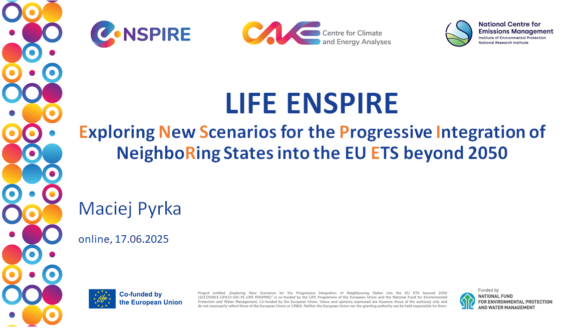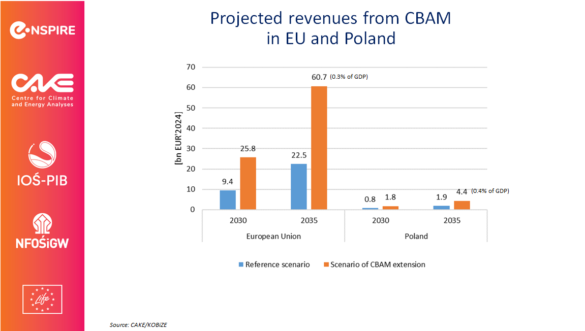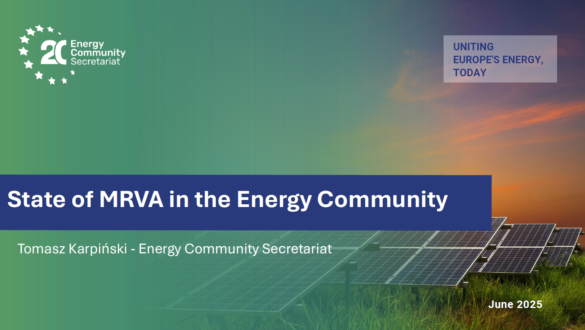LIFE ENSPIRE WEBINAR, “Carbon Pricing: Challenges for the EU and EU Neighbourhood”, 17th June 2025
On the 17 th June 2025 LIFE ENSPIRE webinar on “Carbon Pricing: Challenges for the EU and EU Neighbourhood” was organised by CAKE.
We were delighted to host over 80 participants from Poland, the EU, and neighbouring countries for an in-depth dive into the current challenges and future outlook of climate policy, with a particular focus on carbon pricing, CBAM, MRVA, and cross-border cooperation. The meeting was opened by Marta Rosłaniec (CAKE/KOBIZE) opened he meeting by welcoming the speakers and providing a short brief overview of the LIFE ENSPIRE workshop.
Maciej Pyrka (CAKE/KOBiZE) the LIFE ENSPIRE project coordinator of presented the main goals and scope of the project, which is focused on the carbon pricing. He also presented also the CAKE team and our experiences in climate modelling which were achieved in the previous projects. Finally, he introduced the members of the Advisory Board for the LIFE ENSPIRE project.
Jakub Boratyński (CAKE/KOBiZE) in his presentation provided an analysis of the carbon content and cost estimates for the introduction of the Carbon Border Adjustment Mechanism (CBAM), with projections for 2030 – 2035, based on CAKE’s analysis. Jakub presented the main assumptions for both reference scenario, and the extension scenario. The cost and revenues were presented for Poland, and for the EU. The projected allowance price in EU ETS is 123 EUR in 2030 and 147 EUR in 2035. Please find below a presentation.
Tomasz Karpiński (Energy Community) delivered a presentation on the state of MRVA in the EU neighbouring countries. He also presented the status of the transposition and implementation of the EU ETS directive in several neighbouring countries.
In the second part of the webinar the panel discussion was moderated by our expert Maciej Cygler (CAKE). The core of the discussion centres on the implications and conconsequences of the CBAM for neighbouring countries, as well as the current situation.
Ivan Mrvaljevic (Elektroprivreda Crne Gore, Montenegro) presented resented the latest developments in Montenegro’s preparations for EU accession in the context of the EU ETS and CBAM, with a particular focus on the electricity and energy sectors. It was emphasised that the region is unique and that investment in RES energy and the transmission system is essential. Montenegro has a national EU ETS, and the country is preparing a special plan to implement the full ETS by 2030. Montenegro has expressed its desire to accede to the EU in 2028 or 2029, and is currently engaged in negotiations with the European Commission.
Marie Missao Raude (Florence School of Regulation, European University Institute) provided an overview of the current status of carbon pricing in the EU. Furthermore, the primary elements and objectives of the CBAM were outlined. She also presented several policy changes that are currently under review. These include the 20240 target proposal for emission reduction, the MRS review and the inclusion of carbon removals in the EU ETS. One of the challenges that was highlighted was the impact of the ETS 2 and CBAM changes. She also presented the LIFe COASE project, which is currently managed by the EUI. This provided an excellent opportunity for networking between the two LIFE ENSPIRE and LIFE COASE projects.
Pavlo Masiukov (GIZ, UA) presented a detailed overview of the decarbonisation situation and challenges in Ukraine. He emphasised that Ukraine is a candidate country to the EU and has implemented the Climate Law, which has set a 2050 climate neutrality target. The ETS in Ukraine has been introduced, but its coverage and alignment differ from those of the EU ETS. Therefore, adaptation would be necessary. The MRVA system was introduced in 2021, but was put on hold in 2022 due to the full-scale Russian invasion of Ukraine. It was subsequently reintroduced in 2025, and 500 installations currently provide MRVA reports. There are ongoing developments in the regulations concerning domestic ETS, with the pilot phase scheduled to be implemented in 2028. The final decision on the specific rules for ETS introduction is still under consideration. Ukraine’s challenges in relation to the CBAM are due to the lack of public data that is available due to the ongoing war situation.
The contributions offered fresh insights into how the EU and its neighbours can better align their climate policies and integrate carbon pricing systems more effectively.
Agenda: LIFE ENSPIRE_workshop_agenda_17062025_v3
Presentations:
 LIFE-ENSPIRE_Workshop_Maciej-Pyrka_17062025.pdf (2.1 MiB, 29 hits)
LIFE-ENSPIRE_Workshop_Maciej-Pyrka_17062025.pdf (2.1 MiB, 29 hits)
 LIFE-ENSPIRE_Workshop_CBAM_Jakub-Boratynski_17062025.pdf (1.3 MiB, 26 hits)
LIFE-ENSPIRE_Workshop_CBAM_Jakub-Boratynski_17062025.pdf (1.3 MiB, 26 hits)
 Tomasz Karpiński_State-of-MRVA-in-the-Energy-Community.pdf (1.0 MiB, 28 hits)
Tomasz Karpiński_State-of-MRVA-in-the-Energy-Community.pdf (1.0 MiB, 28 hits)




 Reset ustawień
Reset ustawień Kontrast
Kontrast Widok
Widok Czytelność
Czytelność Czcionka
Czcionka Znaki
Znaki Interlinia
Interlinia Słowa
Słowa Akapity
Akapity Deklaracja dostępności
Deklaracja dostępności









